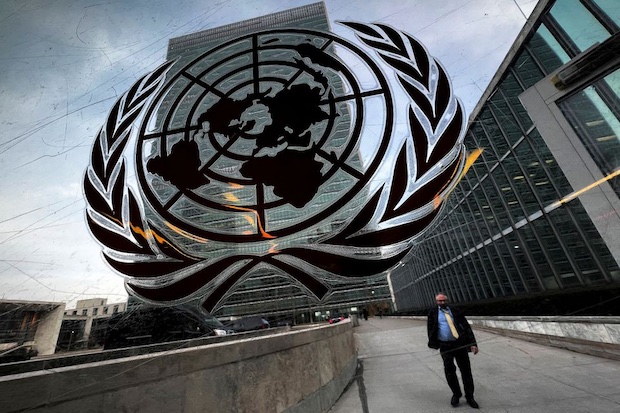
A person departs the United Nations (UN) headquarters building in the Manhattan borough of New York City, New York, US, March 1, 2022. (REUTERS FILE PHOTO)
MANILA, Philippines — The proposal to raise the country’s dispute with China in the West Philippine Sea before the United Nations General Assembly (UNGA) should be carefully studied first, according to Defense Secretary Gilberto Teodoro Jr.
Some senators have backed a suggestion by retired Supreme Court Senior Associate Justice Antonio Carpio to bring Chinese incursions in the country’s waters to the UNGA, to compel Beijing to recognize the 2016 arbitral ruling favoring Manila’s sovereign rights in the West Philippine Sea.
An international arbitral tribunal ruled in 2016 to invalidate China’s sweeping claims to the South China Sea, but Beijing never recognized the ruling.
Teodoro said that aside from weighing in on the proposal, the Philippines should convey to the world its rights in the West Philippine Sea under the United Nations Convention on the Law of the Sea (Unclos) before approaching the UNGA.
“We need to transfer the debate from the Philippines to the rest of the world so that they would understand our cause. If that’s through the UNGA, then the Department of Foreign Affairs (DFA) should study the matter,” he told reporters on the sidelines of the 160th anniversary of the Philippine Forestry Service on Monday.
Security Council
Teodoro pointed out that before the UN could enforce any action, it has to go through the UN Security Council, where its five permanent members have veto power. The permanent members of the council are the United States, China, France, Russia, and the United Kingdom.
“That’s why the UN is sometimes incapacitated… because their actions have to go through the UN Security Council,” he pointed out.
In a Senate resolution filed on June 19, Sen. Risa Hontiveros called on the DFA to seek UNGA’s action that will call on China to end its harassment of Filipino vessels within the country’s exclusive economic zone.
Senators JV Ejercito, Francis Tolentino, and Jinggoy Estrada have backed Hontiveros’ resolution.
Sen. Francis Escudero, however, argued that the arbitral ruling was “more binding and persuasive than a UNGA resolution.”